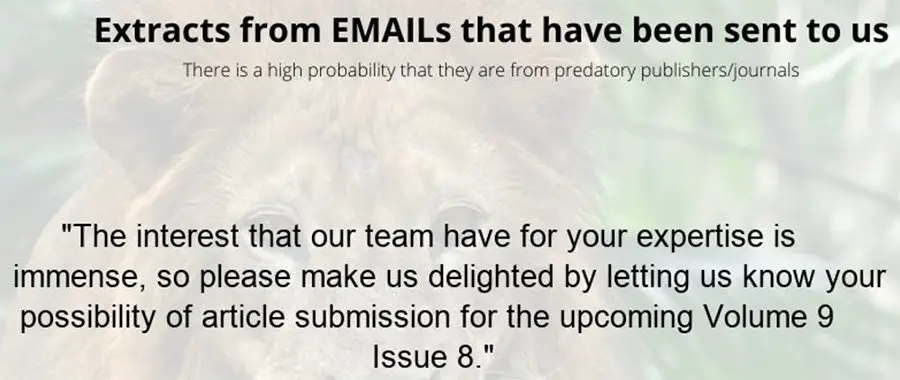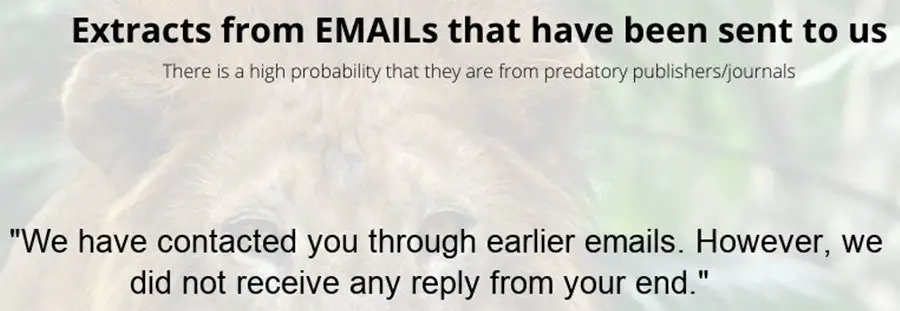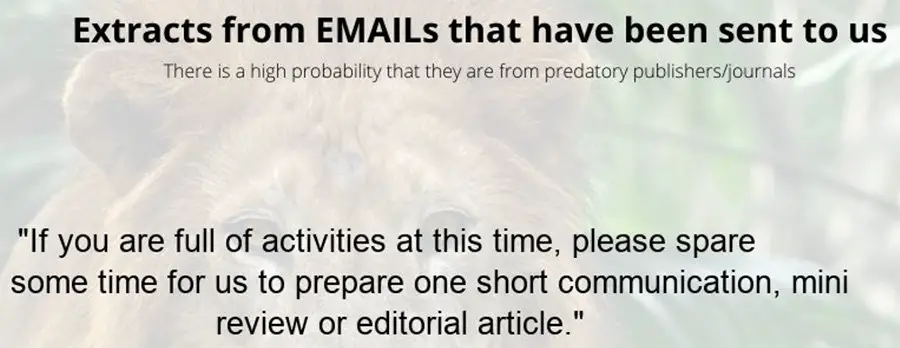Predatory publishers and journals use a variety of techniques to get you to submit your research articles to them, with one of the most common being unsolicited emails, often praising your previous work, then requesting that you to submit to their journal.
In this article we look at some of the ways that predatory publishers and journals approach authors in an attempt to get authors to submit to their journal. Specifically, we look at the initial approach, the type of phrases that are used and what you might look for when deciding whether the email is legitimate.
Finally, we seek you help/support in raising awareness of this issue.
We have a Twitter account which tweets snippets from emails that have been sent to us. They are genuine emails that are inviting authors to submit emails to their journal. We use the hashtag ##PredatoryPublishingEmails and, if you follow this link, you can see some our latest tweets.
Receiving an email from a predatory journal
If you are an academic, you will almost certainly receive emails from journals asking you to submit to their journal. Unless you recognize the journal, have published in it before and know the editors (at least by reputation), it is likely to be from a predatory journal or, at best, a low ranking journal that you might want to avoid.
You should not respond to these emails as they are likely to be from a predatory journal. It is almost guaranteed that they will accept your paper, due the absence of a robust peer review process, if one is present at all. Once your paper is accepted, the journal will expect you to pay an Article Processing Charge (APC), which may not have been mentioned in the email.
If you receive an email from a journal that you do not recognize, the best advice we can give is to simply delete it. If you want to explore other options take a look at our article “How to respond to an EMAIL from a predatory publisher?“
To some these emails are annoying. To others they are amusing. Whether you are amused or annoyed may be influenced by your current workload, your state of mind and/or other priorities that you are facing.
The real worry is that these emails are received by researchers who do not recognize that they are from predatory journals and assume that they have come from a legitimate journal. If the researcher does submit an article, they will be landed with an invoice for publishing the article. The article is unlikely to be cited and it will harm your CV.
Perhaps, even more worrying is that some researchers knowingly submit to predatory journals. We explore the reasons for this in some of our other articles.
Where do predatory publishers get our email addresses from?
Collecting emails
You might wonder where these spammers (let’s call them for what they are) get their email addresses.
They could buy them, they could search through university web sites, they could look through conference proceedings and they could use web scraping to automate the process.
Dadkhah et al., 2014 draws out these points in their article Characteristics of Hijacked Journals and Predatory Publishers: Our Observations in the Academic World. It is in reference to journal hijackers, but the same would apply to predatory publishers.
“Hijackers use various methods to find the author email addresses that they use to send calls for papers promoting opportunities for rapid publication in a reputable place. They use special software to extract lists of email addresses from websites. They scan websites of predatory journals, academic websites, and websites of other hijacked journals to produce lists of potential author email addresses.“
In fact, there are many ways that a spammer can collect email addresses, we suspect, many of which we have never heard of and, to be honest, we would not understand.
If you want to dig a little deeper into spam emails, you might want to take take a look at the following two books [affiliate links] – Anti-spam measures and Regulating spam.
Almost certainly one of the tools they use is “web scraping“, as we say above, as does with Dadkhah et al., 2014. Web scraping is an algorithmic way of extracting information from web pages by using the underlying data structure that represents the web page. Web scraping is a powerful tool and has many uses. Collecting emails is just one of them.
Sample email using (probably) scraped data
Why do we say that predatory publishers use web scraping? This conclusion is based on some of the emails we have seen. If you take a look a Figure 1, you will see a typical email that was received.
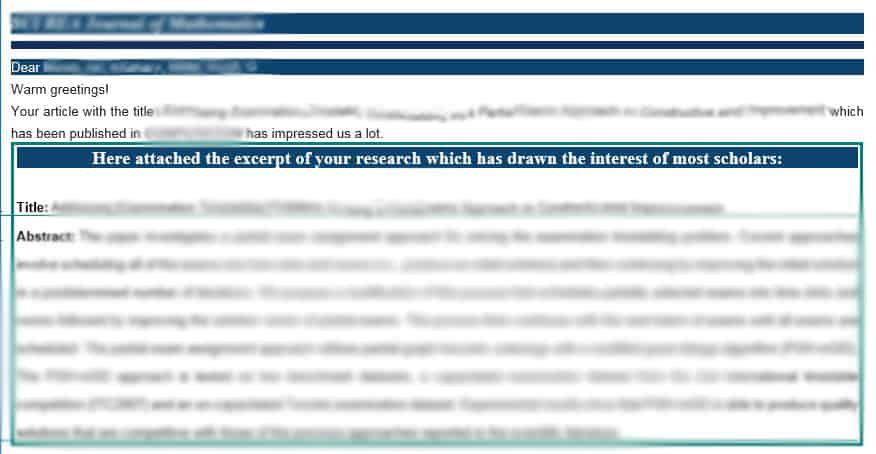
We have obscured parts of the email, to protect the identify of the journal, and also the person who received it.
The points of note are that the email is sent to one of the researchers that wrote the article that is referenced in the email. The email mentions all of the authors, as well as the title and the abstract of the article.
All of this information is available on various web sites, but it would be very time consuming to collect this manually. Moreover, when sending out unsolicited emails, you usually have to send a lot. To send the volume that would be required to get a good return on that investment suggests that manually collecting the data is not feasible.
All of this leads us to believe that some predatory publishers do a significant amount of web scraping, with the data being used to populate their spam emails, trying to give the impression that the publisher knows more about you than they actually do.
If you want to delve a little deeper into web scraping, consider taking a look at Practical Web Scraping for Data Science and/or Getting Structured Data from the Internet [affiliate links].
The nature of predatory emails
We have seen (literally) hundreds of the emails that predatory journals/publishers have sent. Not only do we receive them ourselves, but we also ask others to send them to us.
We store snippets of these email in a database and regularly tweet then using a hashtag of #PredatoryPublishingEmails. If you want to see our latest tweets, follow this link.
Predatory EMAIL Templates
Once you have a few emails from predatory publishers, you notice that many are essentially the same, or at least they draw on the same template, even across different journals. In many cases, the template is obviously at the level of the publisher, which are being used by the various journals in its portfolio.
Some emails are such that when you click on the “Submit a paper” button you then have to select the journal you wish to submit to. To us, this shows that the publisher is just trying to get your interest, without really knowing what journal is most suitable to your research interests.
Predatory journals playing on your ego
Emails from predatory publishers try to massage your ego. They use comments such as “You are an esteemed and remarkable person who can significantly deliver the advancements and innovations in this field” and “Your article entitled [one of your articles] has impressed us a lot. It has attracted much attention from scholars working in [your area].“
We have, on occasions, followed up on these emails by asking why the article impressed them, or where is the evidence that it has received a lot of attention. We ask, for example, are they drawing on some statistics that the article has been cited and could they share these statistics with us.
We have, as yet, never got an answer to these questions as (no doubt) they cannot answer them as these are just email templates with nothing behind them to support the content.
Timing of emails from predatory publishers
We have noticed that we often get a spam email soon after a paper has been accepted. This suggests two things to us. Firstly, the predatory publishers are web scraping pages when papers are in press, but not yet published, or web scraping “current issues” pages. Secondly, any statements they make about the work having an impact is unjustified as the paper has not yet had enough time to have an impact.
Predatory publishers instill a sense of urgency
Predatory publishers often try and inject a sense of urgency by either saying that they need just one more paper to complete an issue and/or by giving a deadline that is only a few days away. They want you to act now, rather than think about it.
The type of phrases we have seen in emails include “Well, we are in deadly need of one article for fruitful release of Upcoming Issue“, “I apologize for the urgency, but could you please submit your paper to [REDACTED] at your soonest possible convenience?” and “Envisaging to have your precious manuscript by this weekend“.
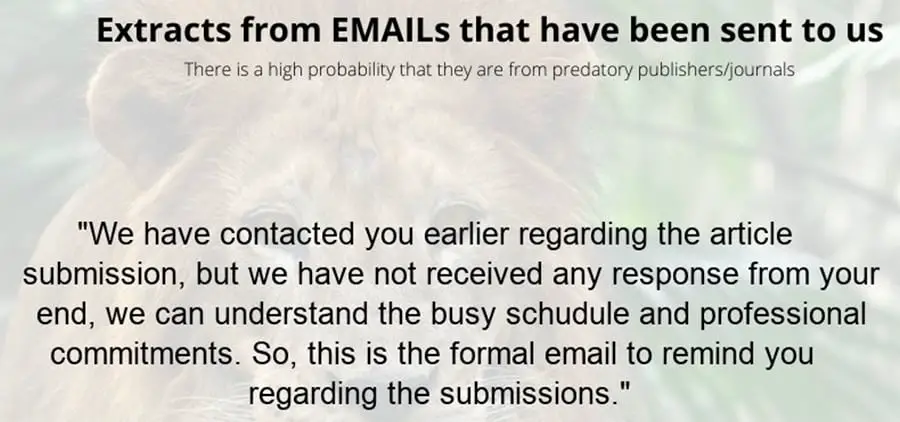
Be under no illusion, these are all designed to get you to submit. There is, in our view, no real deadline. They are not really worried whether you submit in a few days, a few weeks or a few months. They would rather you submit sooner rather than later, but having a submission in a few months is better than having no submission at all.
We can support these assertions, as we have occasionally responded to a request for a paper saying we are very sorry but the deadline is too short so we will have to decline to submit. We often receive a follow up email asking when we could submit, as they are happy to extend the deadline. Or they say that they hope they can rely on us in the future.
In fact, some of the emails we have seen often say that the deadline is flexible, before you even ask for an extension to their deadline.
Predatory journals want a response from you
- They want to engage you in a conversation, so that they can persuade you to submit an article.
- They want to know that your email is “live“, so that it can be used again in the knowledge that the email will be read. They may also be able to sell your email address to others, knowing that they can state that they know that the email address is valid.
There are of course many ways that that a journal publishers can entice you to respond and here are some of the phrases we have seen.
- “I wanted to bump this up in your inbox. Would you mind replying in a week?“
- “When you get a minute, could you please drop me a line regarding my last email on your paper submission?”
Use of "Re:" or giving the impression this email is a follow up
If we see an email that has “Re:” in the subject line, we assume that this is in response to an email. We have noticed that some predatory publishers send an INITIAL email that has “Re:” in the subject line, creating the illusion this is an ongoing conversation. Our view is that if you send an INITIAL email and start the subject with “Re:”, you are trying to deceive the person who receives the email.
In fact, it is not just predatory publishers that do this but this seems to be a marketing technique that is being used more and more.
We saw a conversation about this topic once and it was defended by the sender saying that there was no intention to deceive but it was just meant to indicate that the email was “regarding” the subject line. We don’t buy this. Not only does the subject line define what the email is about but the use of “Re:” is accepted by 99.9% of the population that this is a reply to an email (not that “Re:” means reply, it means regarding).
In our view, if you receive an email from a publisher that has “Re:” in the subject line, don’t just assume that this is the continuation of an earlier email trail. This book on email correspondence [affiliate link] makes no mention of using “Re:” in the subject line.
Predatory journals will accept any type of paper
The image above shows the type of articles that a predatory journal will accept. To be honest, we are not really sure what some of these are (e.g. mini review?). Moreover, is an editorial article subject to peer review (in a high quality, legitimate journal)?
But this is only the tip of the iceberg. We extracted a few types of submission that the journals will accept, from a selection of emails. Again, we are unsure what some of these are, whether they should be peer reviewed (anyway, in even in a legitimate journal), whether they are worth paying an Article Processing Charge (APC) for and whether your peers would accept some of these as a research paper when you apply for promotion or another job.
- 1-2 page editorial
- Articles of Professional Interests
- Brief Communications
- Case report
- Case Studies
- Commentaries
- Editorials
- Letters to the editor
- Mini Review
- Opinion
- Research article
- Review Papers
In short, predatory journals appear to accept almost any type of “article”, just as long as you submit something.
Be wary of emails from predatory journals
If you get an email from a journal inviting you to submit a paper, we would urge you to proceed with caution. We would offer the following advice.
- Carry out some due diligence, by making some basic checks.
- Have you heard of the journal? Do you recognize the editors? Is the email written in a way that seems strange for an approach from an academic journal, for example, saying that they recognize your esteem, how important you are and the impact that your work is having. All of these should raise red flags.
- Does the journal give a web site that you can check. You would be surprised that many do not.
- Does the journal appear to be within your academic area of expertise. As these emails are sent out to generic email lists, it is likely that you will receive emails from journals which you would not consider submitting to, indeed from journals that you have no right to submit to; assuming it is legitimate journal.
- Does the email mention anything about Article Processing Charges (APC)? If not, does the web site state what the charges are?
- Take a look at some of the papers that the journal has previously published. Do they look high quality and would you be happy for your paper to be published in the same journal?
- Does the email mention a previous paper of yours (saying that they were impressed with it). Does that paper fit with the aims and scope of the journal that it is suggesting you submit your next paper to?
- Take a look at the journal’s web site. Does it look professional, do all the links work and is it up to date?
- How does the journal ask you to submit the paper. Some will ask you to email the paper (rather than use an online system). Is the email address sensible, who it is going to and is it specific to that journal?
- Does the journal have an editor-in-chief and are their contact details readily available on the journal’s web site? Can you validate that the editor-in-chief works for a reputable university and has published in high quality journals in areas similar to the journal that has email’ed you?
- If you have any doubts about the journal, simply ignore it and submit your paper elsewhere. The world is not short of journals and predatory journals need you MUCH MORE than you need them.
You may also want to look at some of our previous articles.
Sabine Klein released the following video as we were writing this article. It does a good job of summing up much of what we are saying here. Much of it is German, but there are subtitles, so it can be followed by anybody who can read English. It is definitely worth a look.
We need your help and support
As mentioned in the opening, we regularly tweet email snippets that we have been sent. Some are funny, some are ridiculous and some are worrying, but the reason we do it is to raise awareness.
We would be delighted to receive any emails that you receive so that we can add relevant extracts to our database, which will then be tweeted. There are three ways you can share your emails with us.
- Tweet a copy of the email, tagging us @fake_journals, and using the hashtag #PredatoryPublishingEmails. When we tweet a snippet from this email, we will link to the original tweet so as to recognize that it came from you.
- Send a Direct Message to @fake_journals. This will ensure that your privacy is respected and we will not name you when we tweet snippets from emails received in this way.
- Send an email to admin@predatory-publishing.com. We do not check this email account very often, but do look at it occasionally. If you send an email, we will respect your privacy when we tweet snippets from these emails.
If you can, please send your message as text, rather than just a scanned image, as this makes it easier for us, as we can copy/paste rather than having to retype.
Finally, please retweet our Twitter messages and share the URL (https://twitter.com/hashtag/PredatoryPublishingEmails?f=live), so that others can see them.


